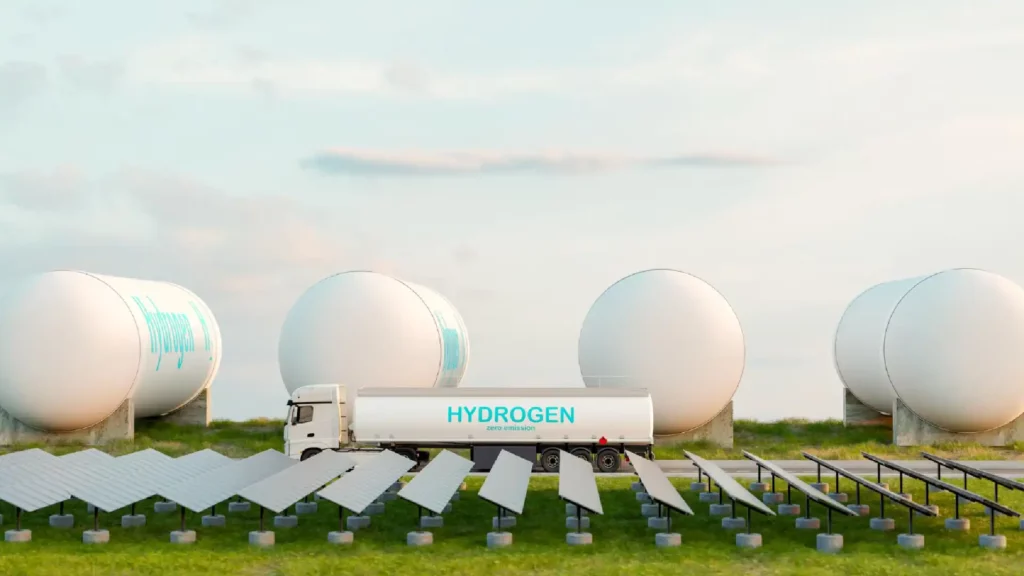The world is at a crucial crossroads when it comes to energy. With the pressing need to transition away from fossil fuels to mitigate climate change, the search for sustainable and clean energy solutions has never been more critical.
I find great hope in the potential of hydrogen energy storage technology to revolutionize our energy landscape.
Understanding Hydrogen Energy Storage Technology
At the heart of the hydrogen energy storage concept is its ability to store and release energy using hydrogen gas as an intermediary.
This technology serves as a vital bridge in the transition to renewable energy sources such as wind and solar, which can be intermittent and unpredictable.
Now, let's explore the core principles of this remarkable process in detail:
- Hydrogen Production: This can be achieved through various methods, including electrolysis, where electricity is used to split water into hydrogen and oxygen, natural gas reforming, or biomass gasification.
- Compression or Liquefaction: Once produced, hydrogen can undergo compression or liquefaction to reduce its volume.
- Storage: Compressed or liquefied hydrogen is stored in specialized tanks or other suitable containers until it's ready to be utilized.
- Energy Release: When the stored energy is needed, hydrogen is converted back into electricity or heat through processes like fuel cells or combustion.
This release of energy can then power a multitude of applications.
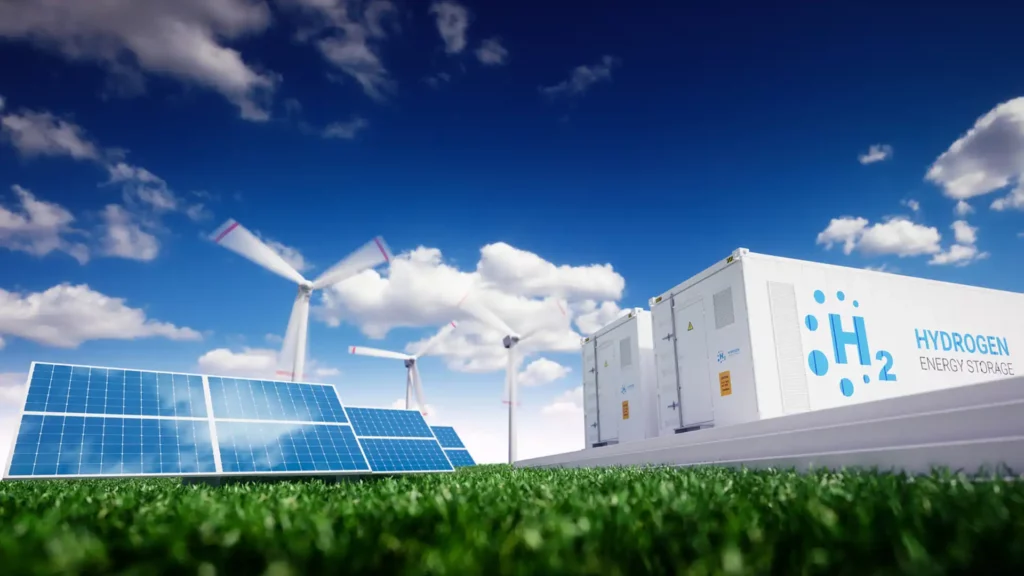
The Advantages of Hydrogen Energy Storage
The potential of hydrogen energy storage technology is immense, and its numerous advantages highlight its pivotal role in the transition to a sustainable energy future:
- Clean and Green: Hydrogen is an abundant element and, when produced using renewable energy sources, it becomes a clean and green energy carrier that emits only water vapor when used.
- Versatility: Hydrogen versatility allows it to be employed in a wide range of applications, from fueling vehicles to powering homes, industries, and heating/cooling systems.
- Energy Storage: Hydrogen can store vast amounts of energy over extended periods, making it a game-changer for addressing the intermittency issues of renewables.
- Reduced Emissions: By replacing fossil fuels in various sectors, hydrogen can significantly contribute to reducing greenhouse gas emissions, a critical step in combatting climate change.
- Energy Security: Hydrogen enhances energy security by reducing dependence on imported fossil fuels, ensuring a more stable and self-sufficient energy supply.
- Scalability: Hydrogen storage systems are highly scalable, and adaptable to meet the specific energy needs of various applications.
- Long Duration Storage: Hydrogen can store energy for extended durations without significant degradation, suitable for seasonal energy storage or emergency backup power.
A Versatile and Scalable Solution Compared to Other Energy Storage Technologies
When it comes to energy storage, there are different options for comparison of energy storage. Let's compare hydrogen storage with other methods:
- Lithium-Ion Batteries: Lithium-ion batteries are crucial for renewable energy growth, powering EVs, and storing solar energy. Despite their efficiency, they have limited capacity and degrade over time. On the other hand, hydrogen energy storage is perfect for long-term, high-capacity needs, making it ideal for grid-scale applications.
- Pumped Hydro Storage: Pumped hydro stores energy with water flow, limited by geography. Hydrogen storage is more flexible and not limited by geography.
- Compressed Air Energy Storage (CAES): CAES stores compressed air underground for electricity. It has advantages but relies on suitable formations. Hydrogen storage is a versatile and energy-dense alternative.
- Molten Salt Thermal Storage: Molten salt thermal storage systems store and release energy using molten salts, mainly in solar power plants. They have limitations and can be costly. Hydrogen energy storage is a versatile alternative for various sectors.
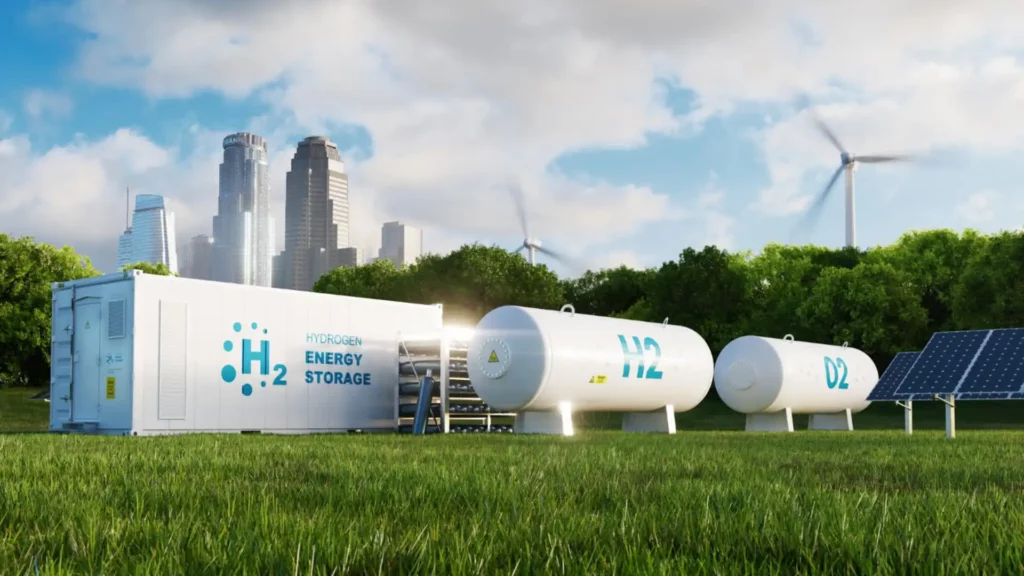
Environmental Impact and Sustainability
As we study hydrogen energy storage, we must consider its environmental impact and role in a sustainable future. Hydrogen's benefits are crucial in reducing carbon emissions and tackling climate change.
- Reduced Greenhouse Gas Emissions
Hydrogen energy storage tech drastically cuts greenhouse gases by using renewable sources. Renewable production, like water electrolysis, emits no greenhouse gases, only oxygen.
- Energy Storage and Grid Stability
Hydrogen is crucial for storing excess energy from intermittent renewable sources like solar and wind. It is generated and stored during periods of high energy production and used to meet energy demand when supply is low, ensuring a stable grid.
- Industrial Decarbonization
Steel production, chemical manufacturing, and refineries emit significant greenhouse gases. Hydrogen can revolutionize these industries by substituting polluting methods with cleaner ones.
- Hydrogen as an Energy Carrier
Hydrogen's role as an energy carrier allows for efficient transportation of clean energy from regions with abundant renewable resources to areas with high energy demand, minimizing the need for transmission lines and reducing energy loss during transport.
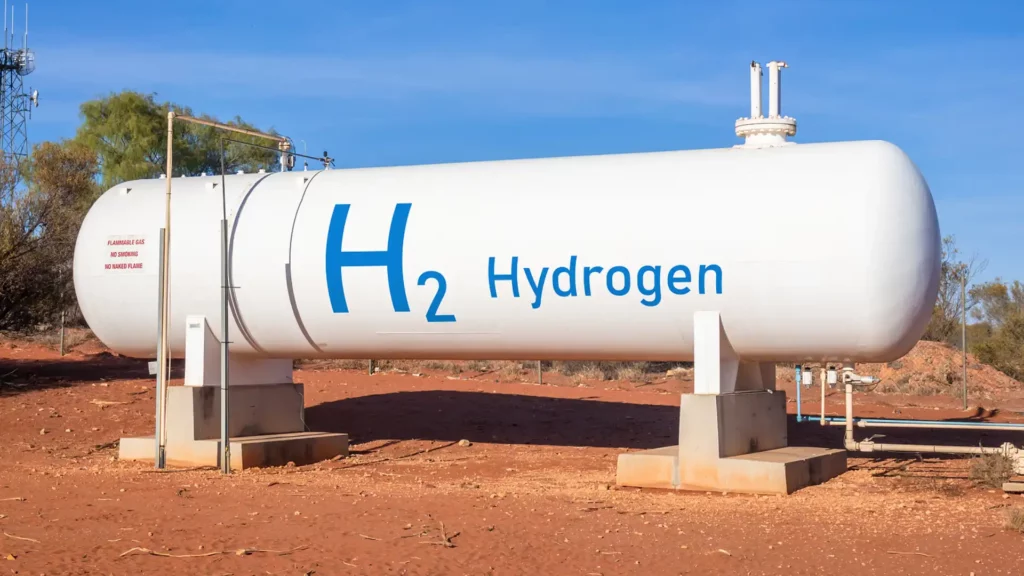
Hydrogen Energy Storage Technology Tips
Harnessing the potential of hydrogen energy storage technology requires careful planning and consideration.
Here are some tips to maximize its benefits and ensure a smooth transition to a cleaner energy future:
- Evaluate Your Energy Needs: Before adopting hydrogen energy storage, assess your energy requirements. Understand the scale, duration, and type of applications you need to power.
- Integrate with Renewable Sources: To truly embrace sustainability, pair hydrogen storage with renewable energy sources such as wind, solar, or hydroelectric power.
- Optimize Efficiency: Invest in efficient hydrogen production methods, such as electrolysis using state-of-the-art equipment.
- Consider Safety: Hydrogen is a highly flammable gas, so safety is paramount. Implement stringent safety protocols, and invest in high-quality storage and transportation solutions.
- Plan for Infrastructure: If you're considering using hydrogen for transportation, ensure that refueling infrastructure is available.
- Storage Medium Selection: Decide whether you'll use compressed hydrogen gas or liquefied hydrogen. The choice depends on your application's specific needs and the associated costs.
- Explore Incentives and Subsidies: Many governments and regions offer incentives and subsidies to promote hydrogen technology adoption.
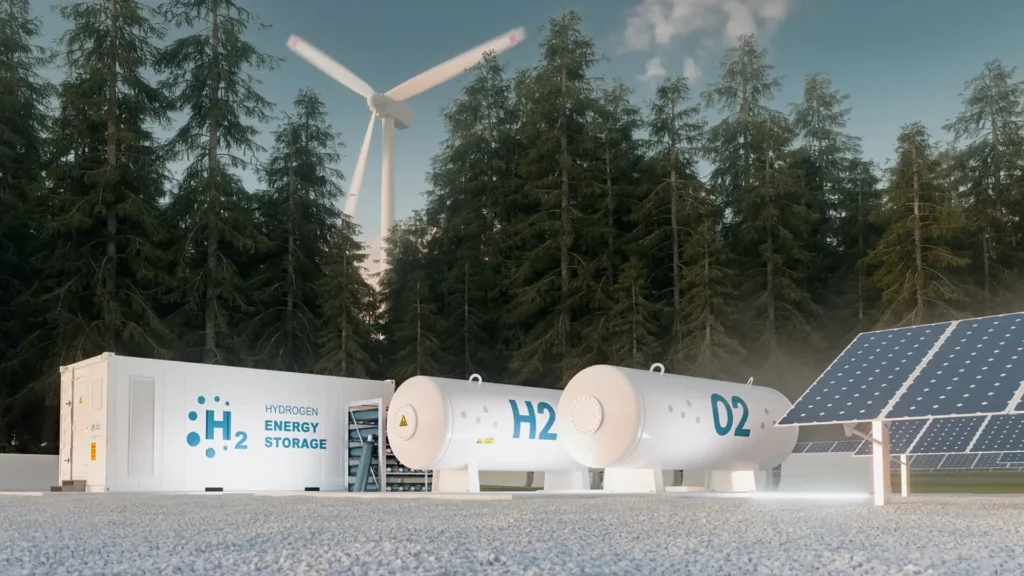
Flywheel Technology for Energy Storage
Hydrogen energy storage is popular, but we must also consider flywheel technology. This innovative approach uses kinetic energy and advanced materials to efficiently store and release electricity, making it significant for energy storage.
How Flywheel Technology Works
Flywheel technology for energy storage operates on a relatively simple yet ingenious principle.
It involves a spinning rotor, typically made of a lightweight, high-strength material such as carbon fiber, enclosed within a vacuum chamber to minimize energy losses due to air resistance.
When surplus electricity is available, it's converted into kinetic energy by accelerating the flywheel's rotation.
Conversely, when energy is needed, the kinetic energy of the spinning flywheel is converted back into electricity.
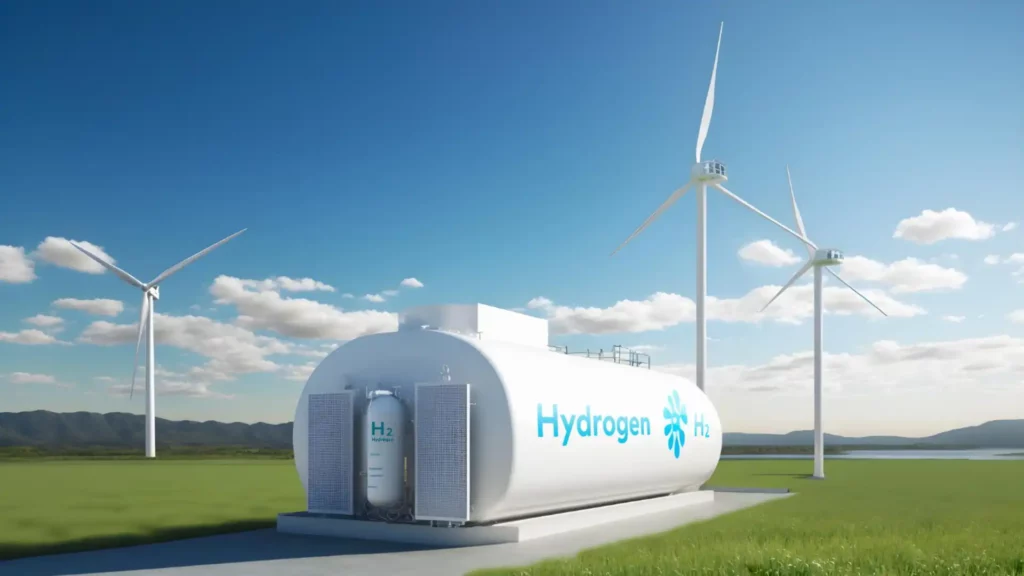
Hydrogen Storage Technologies for Future Energy Systems
The future of energy storage and hydrogen storage technologies holds the promise of revolutionizing future energy systems. Hydrogen storage will play a vital role in sustainability and carbon emission reduction. Solid-state storage and advanced metal hydrides offer higher energy density and improved safety.
The Significance of Hydrogen Storage
Hydrogen storage is crucial for storing energy from renewables, facilitating a smooth transition to green energy. Here's why hydrogen storage technologies are crucial:
- Renewable Energy Integration: As we add more renewable energy sources like wind and solar, hydrogen storage acts as a buffer, storing excess energy for when these sources are not producing.
- Grid Stability: Hydrogen storage stabilizes the grid by absorbing excess energy during low demand and providing extra power during peak demand, reducing fluctuations.
- Transportation: In transportation, hydrogen storage is vital for fuel cell vehicles (FCVs) to safely store and use hydrogen fuel as an alternative to gasoline or diesel-powered vehicles.
Promising Hydrogen Storage Technologies
Now, let's explore some of the cutting-edge hydrogen storage technologies for future energy systems that hold immense promise:
- Solid-State Hydrogen Storage: Solid-state hydrogen storage materials, such as metal hydrides and complex metal hydrides, are garnering significant attention.
- Liquid Organic Hydrogen Carriers (LOHCs): LOHCs are liquid compounds that can bond with hydrogen molecules, effectively storing hydrogen in a liquid form.
- Cryogenic Liquid Hydrogen: Cryogenic hydrogen storage involves cooling hydrogen to extremely low temperatures, where it becomes a dense liquid.
- Advanced Compressed Hydrogen: Researchers are continually improving the efficiency of high-pressure compressed hydrogen storage.
- Chemical Hydrogen Storage: Chemical hydrogen storage involves reactions that release hydrogen gas when needed.
- Underground Hydrogen Storage: In some regions, underground geological formations can be repurposed for hydrogen storage.
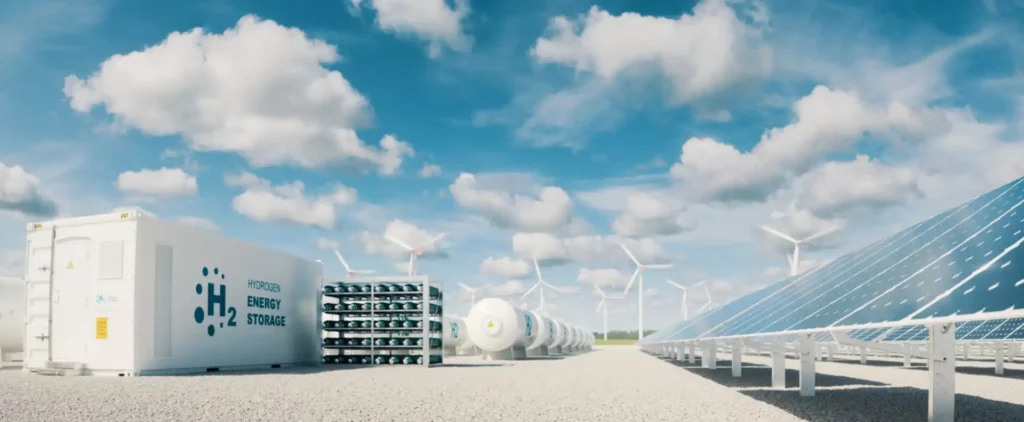
FAQs: Hydrogen Energy Storage Technology
1. What makes hydrogen a suitable energy carrier?
Hydrogen's suitability as an energy carrier stems from its versatility and efficiency. It can be produced using various methods, including renewable energy sources, and can be stored for extended periods. Moreover, hydrogen can replace fossil fuels in numerous applications without emitting harmful pollutants, making it a clean and sustainable energy option.
2. How does hydrogen storage compare to battery storage?
Hydrogen storage and battery storage serve different purposes. Batteries are efficient for short-term energy storage and quick power delivery, while hydrogen excels in long-term and large-scale energy storage. Hydrogen's ability to store vast amounts of energy over extended periods makes it a valuable complement to batteries, especially for stabilizing the grid and managing intermittent renewable energy.
3. What are the safety considerations associated with hydrogen storage?
Hydrogen is a flammable gas, which raises safety concerns. However, safety measures and regulations are in place to mitigate risks. Hydrogen storage tanks are designed to withstand high pressures, and strict safety protocols are followed during production, storage, and transportation. Ongoing research aims to enhance safety measures further.
4. How can hydrogen energy storage contribute to a sustainable future?
Hydrogen energy storage contributes to sustainability by reducing greenhouse gas emissions, enhancing renewable energy integration, and decarbonizing industries. It offers a means to store excess clean energy, reduces reliance on fossil fuels, and supports the transition to a low-carbon economy.
5. Are there any drawbacks or challenges associated with hydrogen energy storage?
While hydrogen energy storage holds great promise, there are challenges to overcome. These include the energy-intensive nature of hydrogen production when fossil fuels are used, the need for infrastructure development, and the cost of technology. However, ongoing research and investments aim to address these challenges and make hydrogen more accessible and sustainable.
6. What are some emerging applications of hydrogen energy storage?
Emerging applications of hydrogen energy storage include its use in aviation, space exploration, and residential energy systems. Hydrogen is being explored as a fuel for aircraft and spacecraft due to its high energy density. Additionally, it can be used in residential settings to store excess solar or wind energy for use during periods of low production.
7. Is hydrogen energy storage available for residential use?
While hydrogen energy storage is not yet widely available for residential use, research and development in this area are ongoing. Experimental systems and pilot projects are exploring the feasibility of using hydrogen for residential energy storage. In the future, it may become a viable option for homeowners seeking sustainable energy solutions.
8. How can individuals and businesses support the development of hydrogen energy storage technology?
Individuals and businesses can support the development of hydrogen energy storage technology by advocating for clean energy policies, investing in renewable energy sources, and staying informed about advancements in the field. Supporting research and development initiatives and considering hydrogen-based solutions for their energy needs can also contribute to the growth of this transformative technology.
Hydrogen Energy Storage Technology Final Thoughts
Reflecting personally on the advancements in hydrogen energy storage technology fills me with hope and excitement for a sustainable energy future. This technology, with its ability to efficiently store and release energy, is a game-changer in our transition away from fossil fuels and towards renewables like wind and solar.
Hydrogen's versatility, produced and stored in various ways, showcases human ingenuity in tackling environmental challenges. This innovation inspires a cleaner, greener world that harmonizes with our energy needs.
Adopting hydrogen tech means committing to a better future. Integrating storage with renewables, pursuing efficiency, and prioritizing safety and infrastructure are vital.
Government incentives and global cooperation are crucial in this transition. Seeing the move towards sustainable energy solutions, driven by technology and collective resolve, is personally uplifting. It fills me with optimism for the future of our planet and future generations.

